Do Australians and New Zealanders Doing business with Indonesia?
VerifiedAdded on 2022/10/11
|6
|1937
|7
Essay
AI Summary
Contribute Materials
Your contribution can guide someone’s learning journey. Share your
documents today.
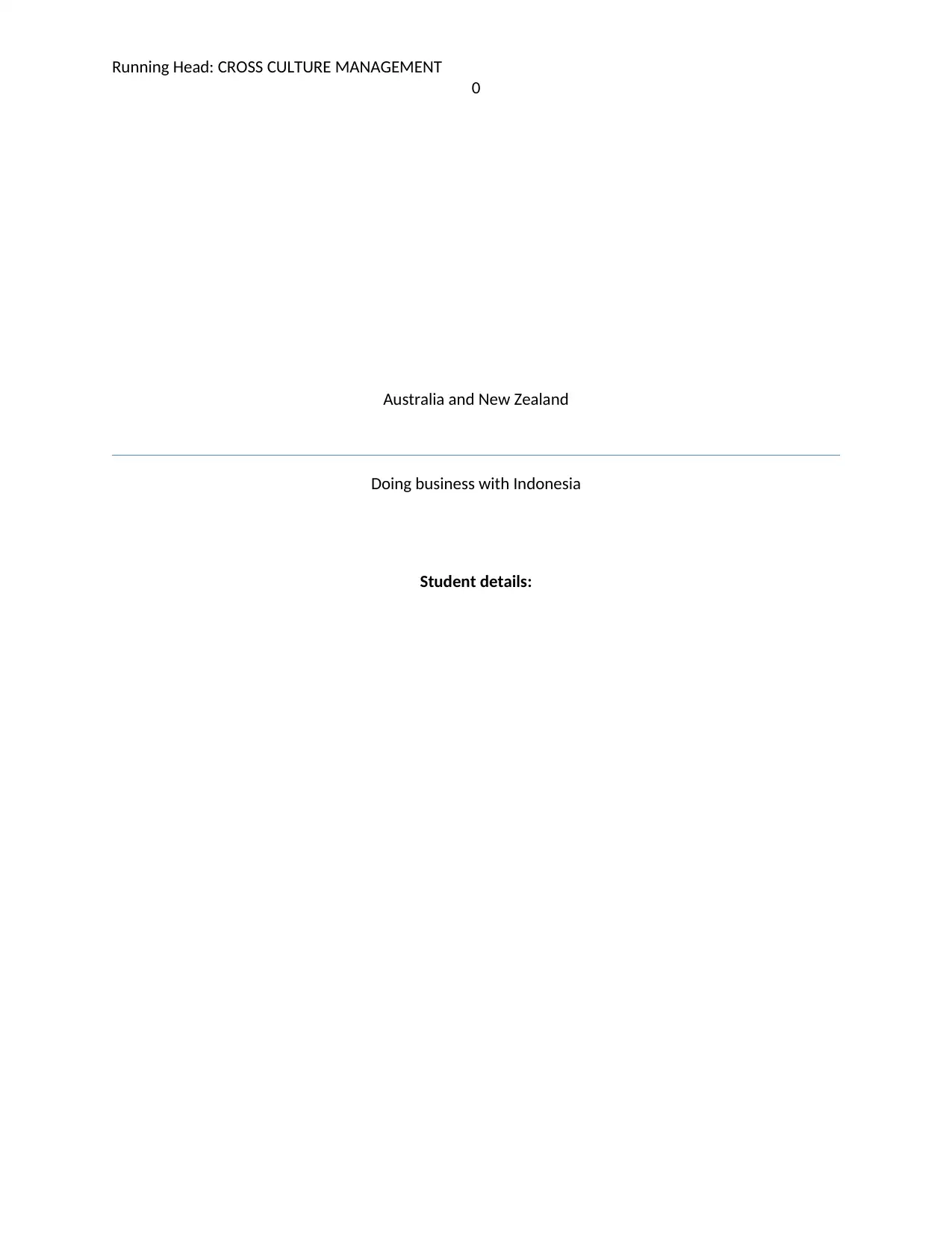
Running Head: CROSS CULTURE MANAGEMENT
0
Australia and New Zealand
Doing business with Indonesia
Student details:
0
Australia and New Zealand
Doing business with Indonesia
Student details:
Secure Best Marks with AI Grader
Need help grading? Try our AI Grader for instant feedback on your assignments.
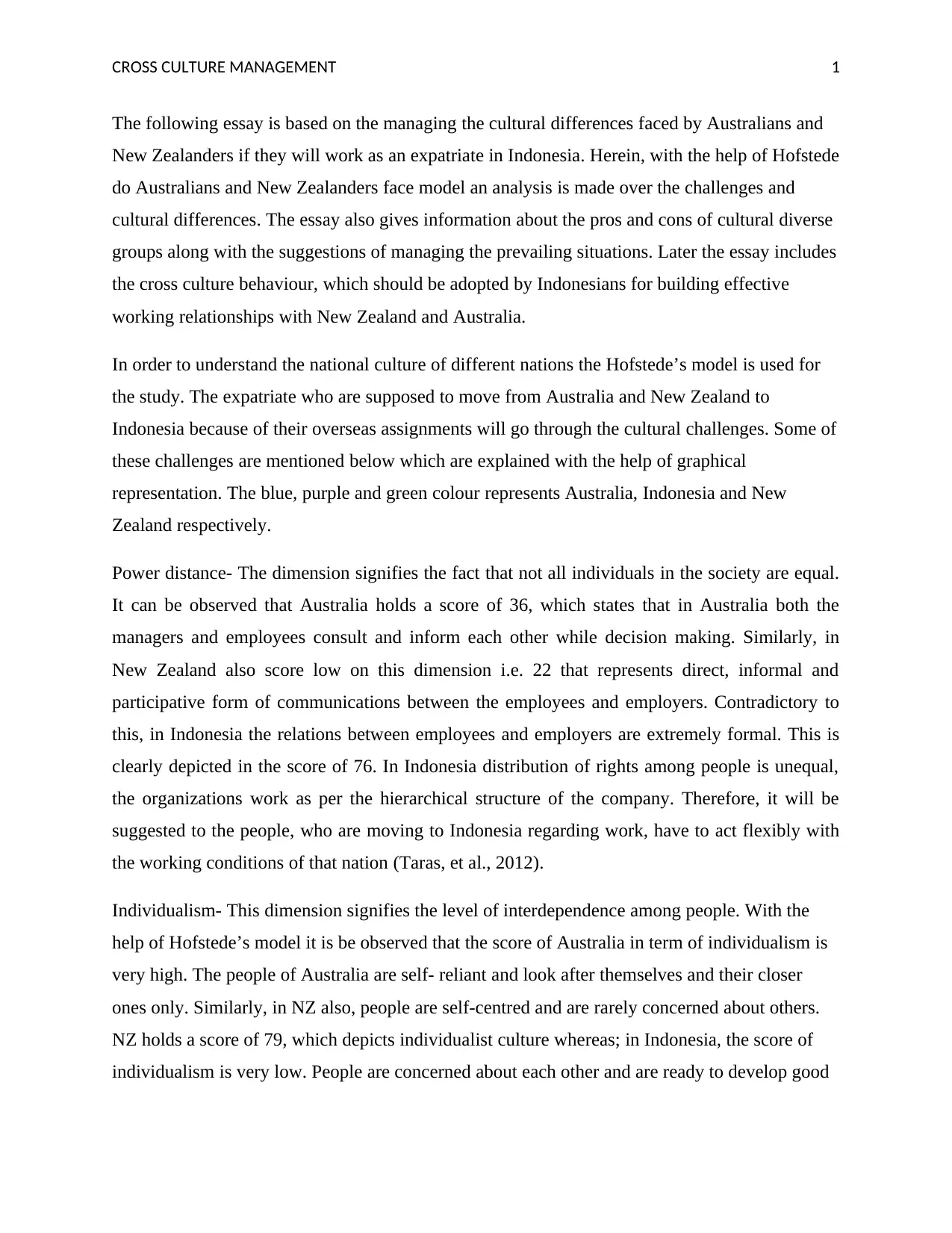
CROSS CULTURE MANAGEMENT 1
The following essay is based on the managing the cultural differences faced by Australians and
New Zealanders if they will work as an expatriate in Indonesia. Herein, with the help of Hofstede
do Australians and New Zealanders face model an analysis is made over the challenges and
cultural differences. The essay also gives information about the pros and cons of cultural diverse
groups along with the suggestions of managing the prevailing situations. Later the essay includes
the cross culture behaviour, which should be adopted by Indonesians for building effective
working relationships with New Zealand and Australia.
In order to understand the national culture of different nations the Hofstede’s model is used for
the study. The expatriate who are supposed to move from Australia and New Zealand to
Indonesia because of their overseas assignments will go through the cultural challenges. Some of
these challenges are mentioned below which are explained with the help of graphical
representation. The blue, purple and green colour represents Australia, Indonesia and New
Zealand respectively.
Power distance- The dimension signifies the fact that not all individuals in the society are equal.
It can be observed that Australia holds a score of 36, which states that in Australia both the
managers and employees consult and inform each other while decision making. Similarly, in
New Zealand also score low on this dimension i.e. 22 that represents direct, informal and
participative form of communications between the employees and employers. Contradictory to
this, in Indonesia the relations between employees and employers are extremely formal. This is
clearly depicted in the score of 76. In Indonesia distribution of rights among people is unequal,
the organizations work as per the hierarchical structure of the company. Therefore, it will be
suggested to the people, who are moving to Indonesia regarding work, have to act flexibly with
the working conditions of that nation (Taras, et al., 2012).
Individualism- This dimension signifies the level of interdependence among people. With the
help of Hofstede’s model it is be observed that the score of Australia in term of individualism is
very high. The people of Australia are self- reliant and look after themselves and their closer
ones only. Similarly, in NZ also, people are self-centred and are rarely concerned about others.
NZ holds a score of 79, which depicts individualist culture whereas; in Indonesia, the score of
individualism is very low. People are concerned about each other and are ready to develop good
The following essay is based on the managing the cultural differences faced by Australians and
New Zealanders if they will work as an expatriate in Indonesia. Herein, with the help of Hofstede
do Australians and New Zealanders face model an analysis is made over the challenges and
cultural differences. The essay also gives information about the pros and cons of cultural diverse
groups along with the suggestions of managing the prevailing situations. Later the essay includes
the cross culture behaviour, which should be adopted by Indonesians for building effective
working relationships with New Zealand and Australia.
In order to understand the national culture of different nations the Hofstede’s model is used for
the study. The expatriate who are supposed to move from Australia and New Zealand to
Indonesia because of their overseas assignments will go through the cultural challenges. Some of
these challenges are mentioned below which are explained with the help of graphical
representation. The blue, purple and green colour represents Australia, Indonesia and New
Zealand respectively.
Power distance- The dimension signifies the fact that not all individuals in the society are equal.
It can be observed that Australia holds a score of 36, which states that in Australia both the
managers and employees consult and inform each other while decision making. Similarly, in
New Zealand also score low on this dimension i.e. 22 that represents direct, informal and
participative form of communications between the employees and employers. Contradictory to
this, in Indonesia the relations between employees and employers are extremely formal. This is
clearly depicted in the score of 76. In Indonesia distribution of rights among people is unequal,
the organizations work as per the hierarchical structure of the company. Therefore, it will be
suggested to the people, who are moving to Indonesia regarding work, have to act flexibly with
the working conditions of that nation (Taras, et al., 2012).
Individualism- This dimension signifies the level of interdependence among people. With the
help of Hofstede’s model it is be observed that the score of Australia in term of individualism is
very high. The people of Australia are self- reliant and look after themselves and their closer
ones only. Similarly, in NZ also, people are self-centred and are rarely concerned about others.
NZ holds a score of 79, which depicts individualist culture whereas; in Indonesia, the score of
individualism is very low. People are concerned about each other and are ready to develop good
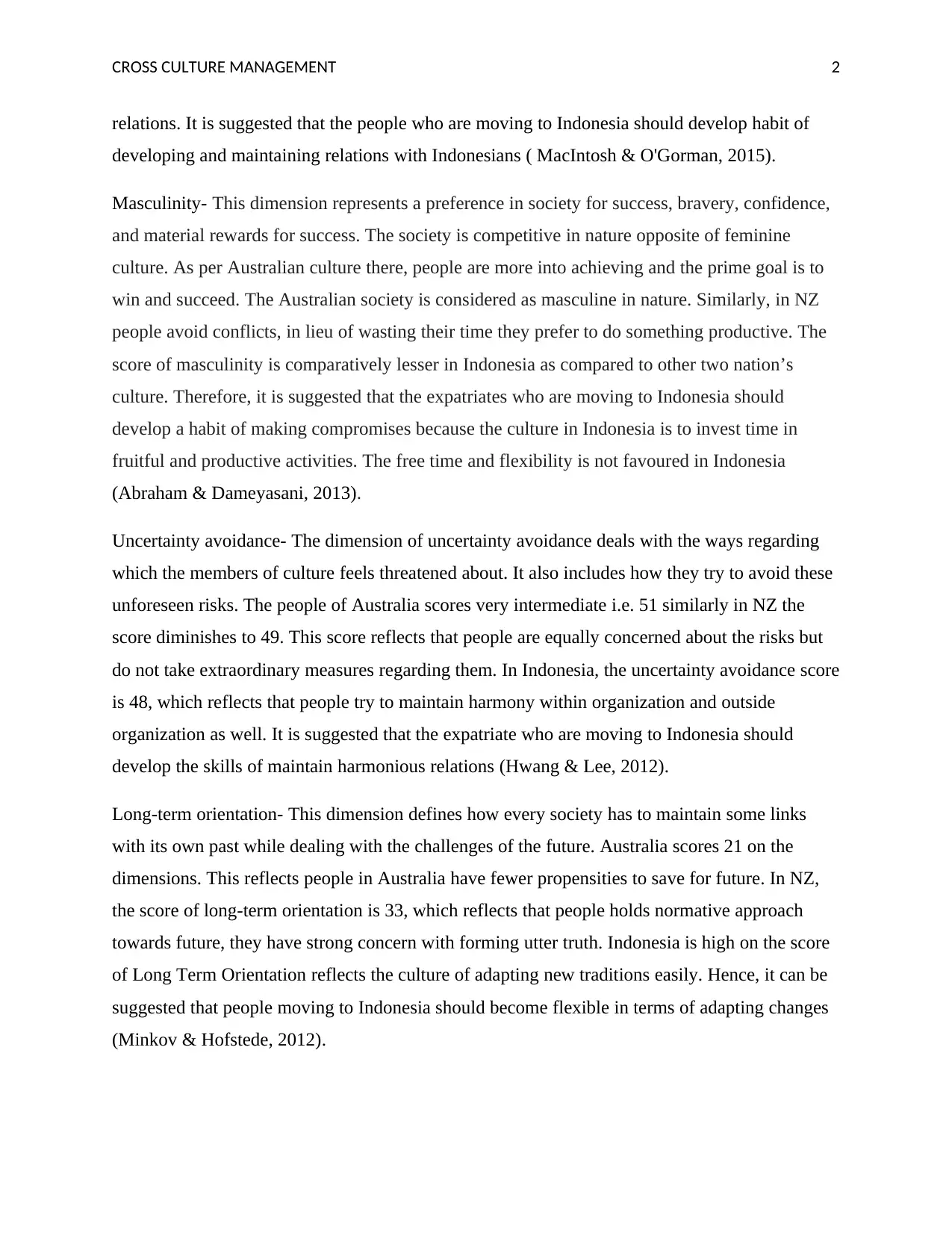
CROSS CULTURE MANAGEMENT 2
relations. It is suggested that the people who are moving to Indonesia should develop habit of
developing and maintaining relations with Indonesians ( MacIntosh & O'Gorman, 2015).
Masculinity- This dimension represents a preference in society for success, bravery, confidence,
and material rewards for success. The society is competitive in nature opposite of feminine
culture. As per Australian culture there, people are more into achieving and the prime goal is to
win and succeed. The Australian society is considered as masculine in nature. Similarly, in NZ
people avoid conflicts, in lieu of wasting their time they prefer to do something productive. The
score of masculinity is comparatively lesser in Indonesia as compared to other two nation’s
culture. Therefore, it is suggested that the expatriates who are moving to Indonesia should
develop a habit of making compromises because the culture in Indonesia is to invest time in
fruitful and productive activities. The free time and flexibility is not favoured in Indonesia
(Abraham & Dameyasani, 2013).
Uncertainty avoidance- The dimension of uncertainty avoidance deals with the ways regarding
which the members of culture feels threatened about. It also includes how they try to avoid these
unforeseen risks. The people of Australia scores very intermediate i.e. 51 similarly in NZ the
score diminishes to 49. This score reflects that people are equally concerned about the risks but
do not take extraordinary measures regarding them. In Indonesia, the uncertainty avoidance score
is 48, which reflects that people try to maintain harmony within organization and outside
organization as well. It is suggested that the expatriate who are moving to Indonesia should
develop the skills of maintain harmonious relations (Hwang & Lee, 2012).
Long-term orientation- This dimension defines how every society has to maintain some links
with its own past while dealing with the challenges of the future. Australia scores 21 on the
dimensions. This reflects people in Australia have fewer propensities to save for future. In NZ,
the score of long-term orientation is 33, which reflects that people holds normative approach
towards future, they have strong concern with forming utter truth. Indonesia is high on the score
of Long Term Orientation reflects the culture of adapting new traditions easily. Hence, it can be
suggested that people moving to Indonesia should become flexible in terms of adapting changes
(Minkov & Hofstede, 2012).
relations. It is suggested that the people who are moving to Indonesia should develop habit of
developing and maintaining relations with Indonesians ( MacIntosh & O'Gorman, 2015).
Masculinity- This dimension represents a preference in society for success, bravery, confidence,
and material rewards for success. The society is competitive in nature opposite of feminine
culture. As per Australian culture there, people are more into achieving and the prime goal is to
win and succeed. The Australian society is considered as masculine in nature. Similarly, in NZ
people avoid conflicts, in lieu of wasting their time they prefer to do something productive. The
score of masculinity is comparatively lesser in Indonesia as compared to other two nation’s
culture. Therefore, it is suggested that the expatriates who are moving to Indonesia should
develop a habit of making compromises because the culture in Indonesia is to invest time in
fruitful and productive activities. The free time and flexibility is not favoured in Indonesia
(Abraham & Dameyasani, 2013).
Uncertainty avoidance- The dimension of uncertainty avoidance deals with the ways regarding
which the members of culture feels threatened about. It also includes how they try to avoid these
unforeseen risks. The people of Australia scores very intermediate i.e. 51 similarly in NZ the
score diminishes to 49. This score reflects that people are equally concerned about the risks but
do not take extraordinary measures regarding them. In Indonesia, the uncertainty avoidance score
is 48, which reflects that people try to maintain harmony within organization and outside
organization as well. It is suggested that the expatriate who are moving to Indonesia should
develop the skills of maintain harmonious relations (Hwang & Lee, 2012).
Long-term orientation- This dimension defines how every society has to maintain some links
with its own past while dealing with the challenges of the future. Australia scores 21 on the
dimensions. This reflects people in Australia have fewer propensities to save for future. In NZ,
the score of long-term orientation is 33, which reflects that people holds normative approach
towards future, they have strong concern with forming utter truth. Indonesia is high on the score
of Long Term Orientation reflects the culture of adapting new traditions easily. Hence, it can be
suggested that people moving to Indonesia should become flexible in terms of adapting changes
(Minkov & Hofstede, 2012).
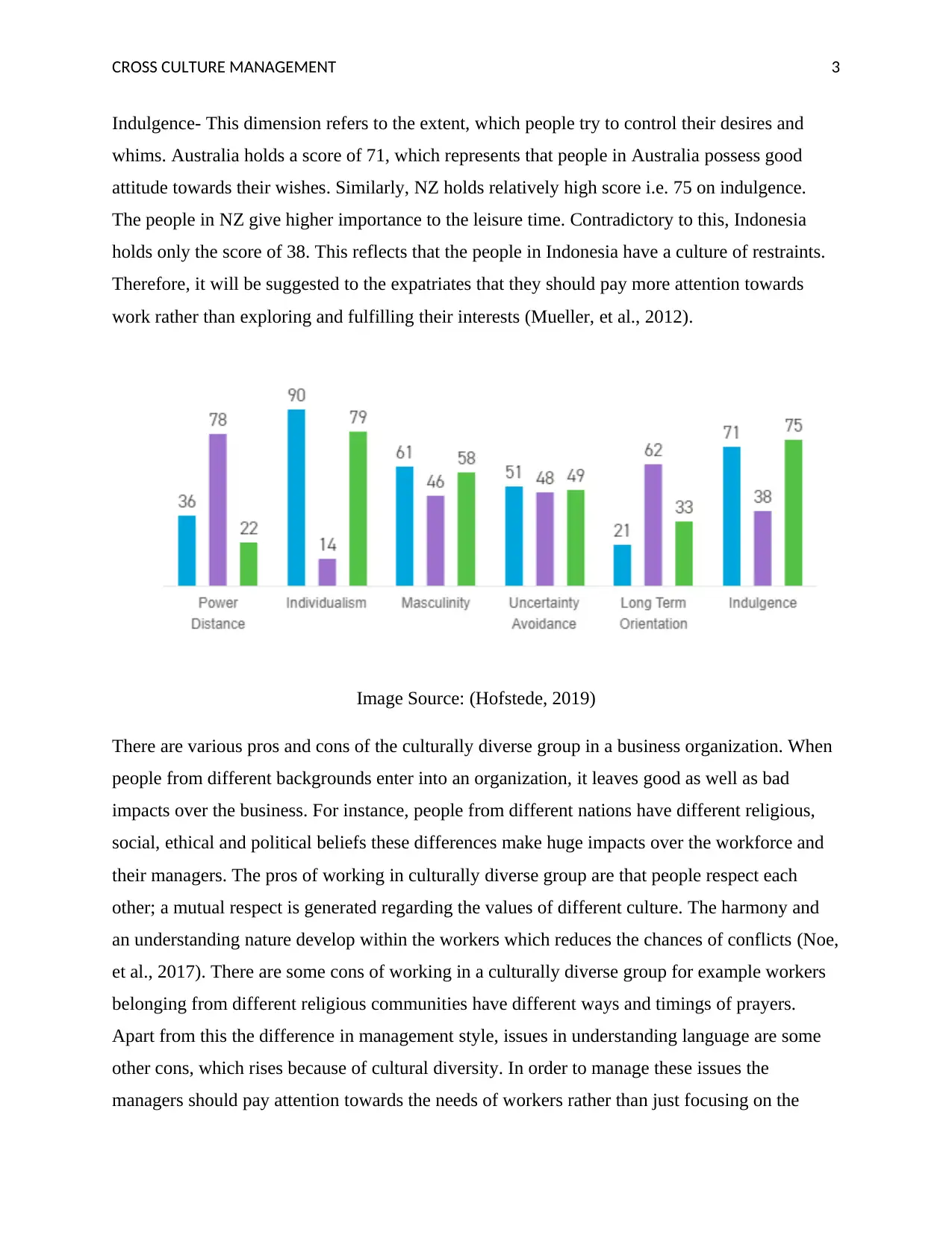
CROSS CULTURE MANAGEMENT 3
Indulgence- This dimension refers to the extent, which people try to control their desires and
whims. Australia holds a score of 71, which represents that people in Australia possess good
attitude towards their wishes. Similarly, NZ holds relatively high score i.e. 75 on indulgence.
The people in NZ give higher importance to the leisure time. Contradictory to this, Indonesia
holds only the score of 38. This reflects that the people in Indonesia have a culture of restraints.
Therefore, it will be suggested to the expatriates that they should pay more attention towards
work rather than exploring and fulfilling their interests (Mueller, et al., 2012).
Image Source: (Hofstede, 2019)
There are various pros and cons of the culturally diverse group in a business organization. When
people from different backgrounds enter into an organization, it leaves good as well as bad
impacts over the business. For instance, people from different nations have different religious,
social, ethical and political beliefs these differences make huge impacts over the workforce and
their managers. The pros of working in culturally diverse group are that people respect each
other; a mutual respect is generated regarding the values of different culture. The harmony and
an understanding nature develop within the workers which reduces the chances of conflicts (Noe,
et al., 2017). There are some cons of working in a culturally diverse group for example workers
belonging from different religious communities have different ways and timings of prayers.
Apart from this the difference in management style, issues in understanding language are some
other cons, which rises because of cultural diversity. In order to manage these issues the
managers should pay attention towards the needs of workers rather than just focusing on the
Indulgence- This dimension refers to the extent, which people try to control their desires and
whims. Australia holds a score of 71, which represents that people in Australia possess good
attitude towards their wishes. Similarly, NZ holds relatively high score i.e. 75 on indulgence.
The people in NZ give higher importance to the leisure time. Contradictory to this, Indonesia
holds only the score of 38. This reflects that the people in Indonesia have a culture of restraints.
Therefore, it will be suggested to the expatriates that they should pay more attention towards
work rather than exploring and fulfilling their interests (Mueller, et al., 2012).
Image Source: (Hofstede, 2019)
There are various pros and cons of the culturally diverse group in a business organization. When
people from different backgrounds enter into an organization, it leaves good as well as bad
impacts over the business. For instance, people from different nations have different religious,
social, ethical and political beliefs these differences make huge impacts over the workforce and
their managers. The pros of working in culturally diverse group are that people respect each
other; a mutual respect is generated regarding the values of different culture. The harmony and
an understanding nature develop within the workers which reduces the chances of conflicts (Noe,
et al., 2017). There are some cons of working in a culturally diverse group for example workers
belonging from different religious communities have different ways and timings of prayers.
Apart from this the difference in management style, issues in understanding language are some
other cons, which rises because of cultural diversity. In order to manage these issues the
managers should pay attention towards the needs of workers rather than just focusing on the
Secure Best Marks with AI Grader
Need help grading? Try our AI Grader for instant feedback on your assignments.
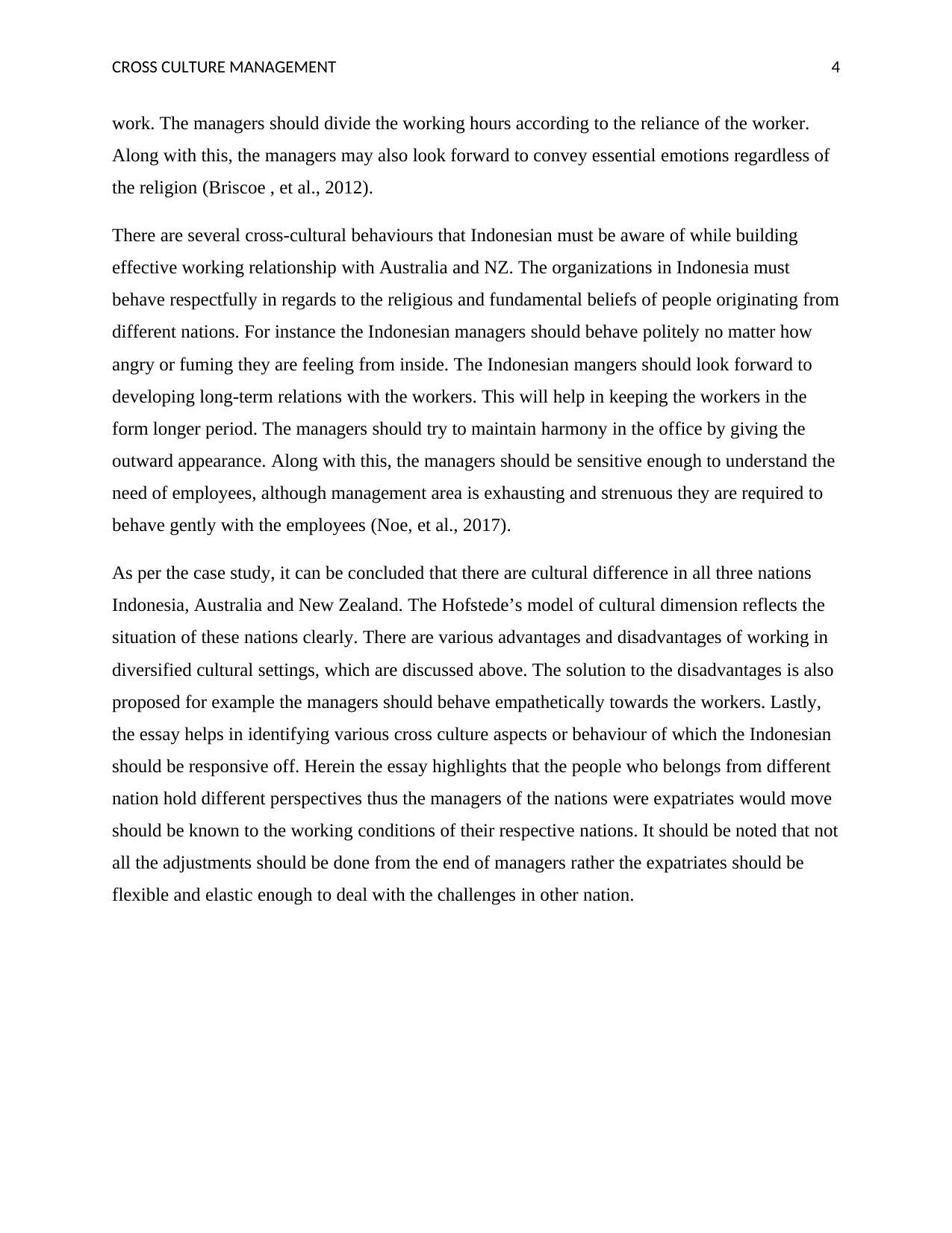
CROSS CULTURE MANAGEMENT 4
work. The managers should divide the working hours according to the reliance of the worker.
Along with this, the managers may also look forward to convey essential emotions regardless of
the religion (Briscoe , et al., 2012).
There are several cross-cultural behaviours that Indonesian must be aware of while building
effective working relationship with Australia and NZ. The organizations in Indonesia must
behave respectfully in regards to the religious and fundamental beliefs of people originating from
different nations. For instance the Indonesian managers should behave politely no matter how
angry or fuming they are feeling from inside. The Indonesian mangers should look forward to
developing long-term relations with the workers. This will help in keeping the workers in the
form longer period. The managers should try to maintain harmony in the office by giving the
outward appearance. Along with this, the managers should be sensitive enough to understand the
need of employees, although management area is exhausting and strenuous they are required to
behave gently with the employees (Noe, et al., 2017).
As per the case study, it can be concluded that there are cultural difference in all three nations
Indonesia, Australia and New Zealand. The Hofstede’s model of cultural dimension reflects the
situation of these nations clearly. There are various advantages and disadvantages of working in
diversified cultural settings, which are discussed above. The solution to the disadvantages is also
proposed for example the managers should behave empathetically towards the workers. Lastly,
the essay helps in identifying various cross culture aspects or behaviour of which the Indonesian
should be responsive off. Herein the essay highlights that the people who belongs from different
nation hold different perspectives thus the managers of the nations were expatriates would move
should be known to the working conditions of their respective nations. It should be noted that not
all the adjustments should be done from the end of managers rather the expatriates should be
flexible and elastic enough to deal with the challenges in other nation.
work. The managers should divide the working hours according to the reliance of the worker.
Along with this, the managers may also look forward to convey essential emotions regardless of
the religion (Briscoe , et al., 2012).
There are several cross-cultural behaviours that Indonesian must be aware of while building
effective working relationship with Australia and NZ. The organizations in Indonesia must
behave respectfully in regards to the religious and fundamental beliefs of people originating from
different nations. For instance the Indonesian managers should behave politely no matter how
angry or fuming they are feeling from inside. The Indonesian mangers should look forward to
developing long-term relations with the workers. This will help in keeping the workers in the
form longer period. The managers should try to maintain harmony in the office by giving the
outward appearance. Along with this, the managers should be sensitive enough to understand the
need of employees, although management area is exhausting and strenuous they are required to
behave gently with the employees (Noe, et al., 2017).
As per the case study, it can be concluded that there are cultural difference in all three nations
Indonesia, Australia and New Zealand. The Hofstede’s model of cultural dimension reflects the
situation of these nations clearly. There are various advantages and disadvantages of working in
diversified cultural settings, which are discussed above. The solution to the disadvantages is also
proposed for example the managers should behave empathetically towards the workers. Lastly,
the essay helps in identifying various cross culture aspects or behaviour of which the Indonesian
should be responsive off. Herein the essay highlights that the people who belongs from different
nation hold different perspectives thus the managers of the nations were expatriates would move
should be known to the working conditions of their respective nations. It should be noted that not
all the adjustments should be done from the end of managers rather the expatriates should be
flexible and elastic enough to deal with the challenges in other nation.
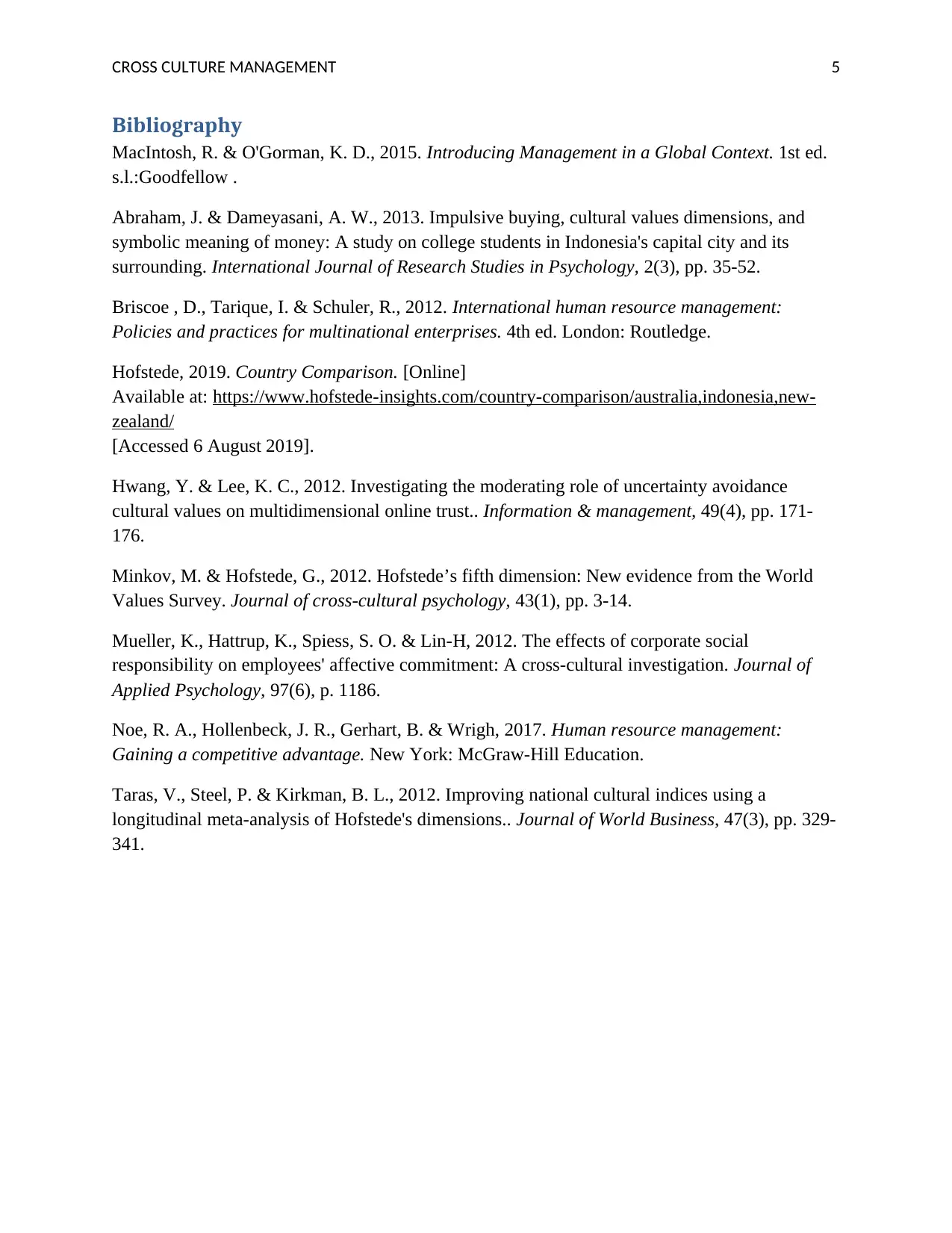
CROSS CULTURE MANAGEMENT 5
Bibliography
MacIntosh, R. & O'Gorman, K. D., 2015. Introducing Management in a Global Context. 1st ed.
s.l.:Goodfellow .
Abraham, J. & Dameyasani, A. W., 2013. Impulsive buying, cultural values dimensions, and
symbolic meaning of money: A study on college students in Indonesia's capital city and its
surrounding. International Journal of Research Studies in Psychology, 2(3), pp. 35-52.
Briscoe , D., Tarique, I. & Schuler, R., 2012. International human resource management:
Policies and practices for multinational enterprises. 4th ed. London: Routledge.
Hofstede, 2019. Country Comparison. [Online]
Available at: https://www.hofstede-insights.com/country-comparison/australia,indonesia,new-
zealand/
[Accessed 6 August 2019].
Hwang, Y. & Lee, K. C., 2012. Investigating the moderating role of uncertainty avoidance
cultural values on multidimensional online trust.. Information & management, 49(4), pp. 171-
176.
Minkov, M. & Hofstede, G., 2012. Hofstede’s fifth dimension: New evidence from the World
Values Survey. Journal of cross-cultural psychology, 43(1), pp. 3-14.
Mueller, K., Hattrup, K., Spiess, S. O. & Lin-H, 2012. The effects of corporate social
responsibility on employees' affective commitment: A cross-cultural investigation. Journal of
Applied Psychology, 97(6), p. 1186.
Noe, R. A., Hollenbeck, J. R., Gerhart, B. & Wrigh, 2017. Human resource management:
Gaining a competitive advantage. New York: McGraw-Hill Education.
Taras, V., Steel, P. & Kirkman, B. L., 2012. Improving national cultural indices using a
longitudinal meta-analysis of Hofstede's dimensions.. Journal of World Business, 47(3), pp. 329-
341.
Bibliography
MacIntosh, R. & O'Gorman, K. D., 2015. Introducing Management in a Global Context. 1st ed.
s.l.:Goodfellow .
Abraham, J. & Dameyasani, A. W., 2013. Impulsive buying, cultural values dimensions, and
symbolic meaning of money: A study on college students in Indonesia's capital city and its
surrounding. International Journal of Research Studies in Psychology, 2(3), pp. 35-52.
Briscoe , D., Tarique, I. & Schuler, R., 2012. International human resource management:
Policies and practices for multinational enterprises. 4th ed. London: Routledge.
Hofstede, 2019. Country Comparison. [Online]
Available at: https://www.hofstede-insights.com/country-comparison/australia,indonesia,new-
zealand/
[Accessed 6 August 2019].
Hwang, Y. & Lee, K. C., 2012. Investigating the moderating role of uncertainty avoidance
cultural values on multidimensional online trust.. Information & management, 49(4), pp. 171-
176.
Minkov, M. & Hofstede, G., 2012. Hofstede’s fifth dimension: New evidence from the World
Values Survey. Journal of cross-cultural psychology, 43(1), pp. 3-14.
Mueller, K., Hattrup, K., Spiess, S. O. & Lin-H, 2012. The effects of corporate social
responsibility on employees' affective commitment: A cross-cultural investigation. Journal of
Applied Psychology, 97(6), p. 1186.
Noe, R. A., Hollenbeck, J. R., Gerhart, B. & Wrigh, 2017. Human resource management:
Gaining a competitive advantage. New York: McGraw-Hill Education.
Taras, V., Steel, P. & Kirkman, B. L., 2012. Improving national cultural indices using a
longitudinal meta-analysis of Hofstede's dimensions.. Journal of World Business, 47(3), pp. 329-
341.
1 out of 6
Related Documents
Your All-in-One AI-Powered Toolkit for Academic Success.
+13062052269
info@desklib.com
Available 24*7 on WhatsApp / Email
![[object Object]](/_next/static/media/star-bottom.7253800d.svg)
Unlock your academic potential
© 2024 | Zucol Services PVT LTD | All rights reserved.





